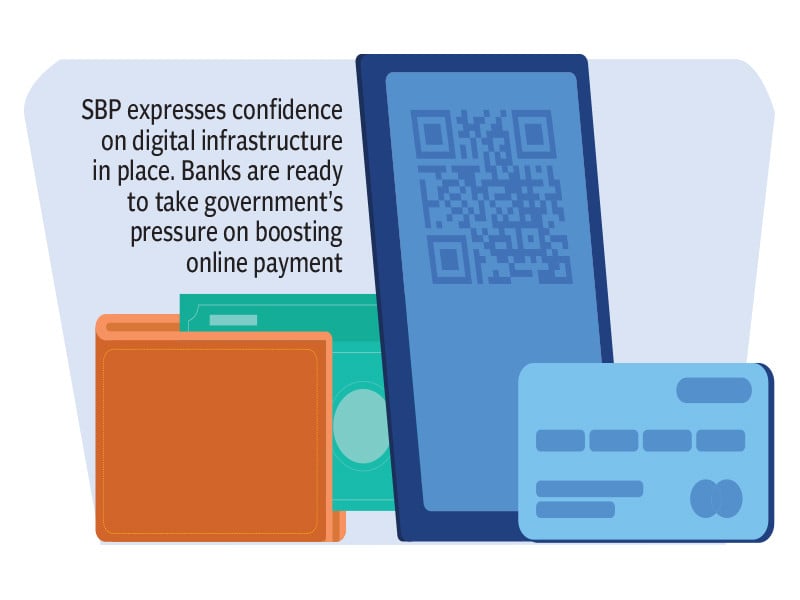
Pakistan's central bank has recently reviewed the digital payment infrastructure working in the country and has expressed full confidence that banks and relevant vendors are well capable of bearing the government's pressure to rapidly migrate to digital payments from cash-based transactions.
Speaking at a conference titled "Future Banking Summit 2024", organised by Total Communications on Monday, State Bank of Pakistan (SBP) Executive Director Digital Financial Services Group Syed Sohail Javaad said, "The government is all set to raise a huge demand for digitalisation. We are sure we will efficiently manage it."
He claimed that Pakistan's digital banking infrastructure was as strongly capable of taking high pressure as that of India, recalling that the neighbouring country efficiently coped with the cash crunch in 2016 after its government demonetised almost 86% of banknotes including notes of Rs500 and Rs1,000 denominations to check corruption.
"I am sure banks and vendors are all ready to pass through the digitalisation pressure, though some vendors may run into trouble."
Earlier, Finance Minister Muhammad Aurangzeb declared a "war on cash" in an attempt to bring back the huge currency in circulation, estimated at Rs9.3 trillion, into the banking system and boost tax revenue collection.
The SBP's Javaad said the government had already started paying salaries to its employees and bills of vendors via the central bank's instant online payment system – Raast. The collection of tax revenue and other financial transactions pertaining to government departments are increasingly being made via digital means.
At present, the government is paying salaries to more than 90% of its employees in the federal capital Islamabad via Raast. The federal government employees' salaries, processed via Karachi, were handled through Raast for the first time last month.
From next month, the salaries to the Auditor General of Pakistan (AGP) and government employees in Punjab and Khyber-Pakhtunkhwa will be made through Raast. "The government is keen on digitising payments."
Javaad remarked that online financial transactions via Raast were growing at a fast pace, leading the country towards a digital economy. The number of financial transactions via Raast has now spiked to 2.5-2.6 million a day from 1.8 million in June 2024.
The SBP executive director revealed that the initial Rs1 trillion worth of financial transactions on Raast were done in 336 days while the last transactions valuing at Rs1 trillion were made recently in only 22 days. The trend shows how fast the instant payment system is growing. He said payment transactions through mobile wallets, branchless banking, Electronic Money Institutions (EMIs), fintech and e-commerce had significantly jumped over the past five years.
The top two branchless banks alone are making 65% of the total transactions via Raast, while EMIs are playing a significant role in digitalising the payment system. "There are more EMI players in the pipeline. They are expected to start operations in the country."
Javaad said global practices suggested that digitalisation of any entity would increase sales by 10 to 20 times and urged banks to continue to invest in technology to thrive, upgrade their businesses and support economic growth. He added that around 84% of financial transactions were being done via online banking, while only 16% were conducted over the counter (OTC).
In terms of the size of funds, however, merely 17% of financial transactions are being made digitally, suggesting the fear of losing money and the lack of trust in technology, which is not letting people make big transactions via digital means.
Giesecke & Devrient GmbH Business Development Director Carmine Grabandt remarked, "Cash remains the king globally. It cannot be wiped out completely. It remains important for societies when infrastructure breaks down like in times of flooding."
Bank Alfalah Chief Digital Officer and Group Head Yahya Khan said almost one-third of the cash of around Rs9.3 trillion remained in circulation, causing high inflation and fuelling an informal economy.
He suggested that banks should deploy ATM machines for cash collection from the businesses that remained open after 5pm, when banks were closed for day-to-day public dealings.

1727242355-0/Diddy-(1)1727242355-0-405x300.webp)
1727242355-0/Diddy-(1)1727242355-0-165x106.webp)















COMMENTS
Comments are moderated and generally will be posted if they are on-topic and not abusive.
For more information, please see our Comments FAQ